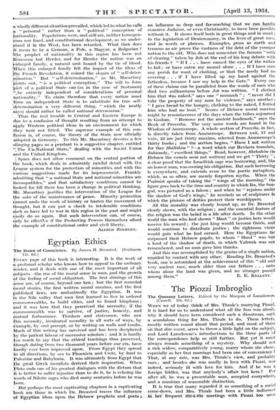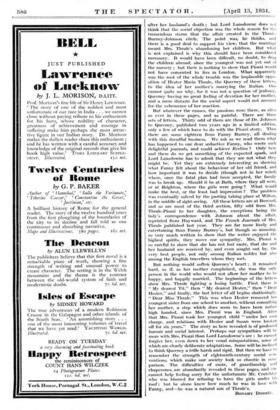The Piozzi Imbroglio
The Queeney Letters. Edited by the Marquis of Lansdowne. (Cassell. 10s. 6d.) WHEN we of today think. of -Mrs. Thrale's marrying Pio9i, it is hard for us to understand what all the fuss was about, why it should have been considered such a disastrous, sueli a scandalous thing for Mrs. Thrale. to do. These letteisi mostly written round about that period, and most of them on that dire event, serve to throw a little light on the subjqt, and Lord Lansdowne's introductions to the three parts :of the correspondence help us. still further. But yet it must always remain something of a mystery. Why should not a rich widow, compafatiVely young, marry -whom 'she chose, especially as her first marriage had been one of convenience ? That, at any rate, was Mrs. Thrale's view, and probably ours ; and besides she was madly in love with Piozzi, was indeed, seriously ill with love for him. And if he was a foreign fiddler, was that anybody's affair but, hers ? For after all, he was a presentable man, accepted everywhere; and a musician of reasonable distinction.
It is true that many regarded it as something of a social come-down, and Mrs. Thrale had been a little indiscreet bti• frequent fife-a-Me meetings- with Piozzi too • sOon after her husband's death ; but Lord Lansdowne does not think that the social- objection was the whole reason for the tremendous storm that the affair created in the Thrale- Burney-Johnson circle. The point Was; he thinks, and there is a good deal to support his view, that the marriage meant Mrs. Thrale's abandoning her children. But what is not explained is why this should have been considered necessary. It would have been difficult, no doubt, to drag the children abroad, since the youngest was not yet out of the nursery ; but there is nothing to show that Piozzi would not have consented to live in London. What apparently was the root of the whole trouble was the implacable oppo- sition of _Hester Maria 'Thrale, the Queeney of these letters, to the idea of her mother's marrying the Italian. One cannot quite see why, for it was not a question of jealousy, Queeney having no great feeling of devotion for her mother, and a mere distaste for the social aspect would not account for the vehemence of her reaction.
But whatever the causes, the passions were there, as alive as ever in these pages, and as painful. There are three sets of letters. Thirty odd of them are those of Dr. Johnson to Queeney, published two years ago in a limited edition, only a few of which have to do with the Piozzi story. Then there are some eighteen from Fanny Burney, all dealing with this dreadful business. We ask as we read them what has happened to our dear seductive Fanny, who wrote such delightful journals, and could achieve Evelina? Only here and there do we get something of the expected spark, and Lord Lansdowne has to -admit that they are not what they might be. Yet they are extremely interesting as showing what Fanny felt about the behaviour of her old Mend, and how important it was to decide (though not in her mind) where, once the fatal plan had been accepted, the family was to break up. Should it be at Bath, where they all were, or at Brighton, where the girls were going ? What would make the best, or the least bad impression ? The problem was eventually solved by the parting taking place at Wilton, in the middle of sight-seeing. All these letters are at Bowood, and so are most of the third section, fifty odd from Mrs. Thrale-Piozzi to her daughter, the exceptions being the lady's correspondence with Johnson about the affair, reprinted from Hayward, and The French Journals. of Mrs. Thrale published last year. They are far more lively and entertaining than Fanny Burney's, but though so amusing, so very much written to show that the writer enjoyed the highest spirits, they move our sympathy. Mrs. Piozzi is so careful to show that she has not lost caste, that she and her husband arc received by, and even sought out by, the very best people, not only among Italian nobles but also among the English travellers whom they met.
But nothing would soften Queeney's heart : it remained hard, as if, as her mother complained, she was the only person" M the world• who would not allow her mother to be happy, and happily married. The beginnings of the letters show Mrs. Thrale fighting a losing battle. First there is "My dearest Tit," then "My dearest Hester," then "Dear Hester," and finally, the last letter of all begins shatteringly, "Dear Miss Thrale." This was when Hester removed her youngest sister from one school to another, without consulting her mother, a step which does seem to have been rather high handed, since Mrs. Piozzi was in England. After that Mrs.- Piozzi took her youngest child "under her own charge, and relations with Hester and Susan were broken off for six years." The story as here revealed. is of profound human and social interest. Perhaps our sympathies will be more with Mrs. Piozzi than Lord Lansdoxvne's are : he cannot forgive her, even down to her venal misquotations, some of which are clearly deliberate adaptations. Some will be inclined to think Queeney a trifle harsh and rigid. But then we have to remember the strength of eighteenth-century social con- ventions, which make our society look so chaotic in com- parison. The difficulties of caste, of guardianship and chaperones, are abundantly revealed in these pages, and one . cannot help feeling sorry for the unfortunate -Mr. Crutchley who was blamed for refusing to have the girls under his roof : but he alone knew how much he was in love with Fanny, and—he was a natural son of Thrale's.
BONAMY DOBRIC.L.

















































 Previous page
Previous page